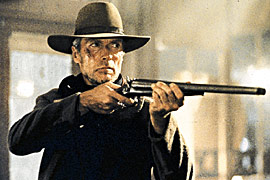Movie Review: Unforgiven

In 1992, the Academy recognized Clint Eastwood for the first time ever. In his long career, he had played iconic characters in Sergio Leone’s Westerns and Dirty Harry, easily Hollywood royalty by this time. But he had hit a bit of a slump at this point of his career, doing movies like Pink Cadillac and The Rookie. With Unforgiven, he got right down to business and got nominated three times, as actor, director, and producer.
That he won Best Picture and director makes me wonder why the Academy felt the urge to coronate him again in 2004 with Million Dollar Baby (a movie, yes, I love, but the sentiment seemed to be, we need to get a win for Clint as if he had never been awarded before), but that’s the Academy for you.
Unforgiven is set in the 1880’s and begins with a man and his buddy roughing up prostitutes in a town called Big Whiskey, Wyoming. The law, represented by Little Bill Daggett (Best Supporting Actor Gene Hackman) tries to find a fair punishment, thinking a whipping will do, but ending up only asking for the men’s horses. This is an unacceptable to the league of whores, led by Strawberry Alice (Frances Fisher), and they decide to pool their money together to hire an assassin to kill the two roughians.
Enter William Munny (Eastwood) who is approached by The Schofield Kid (Jaimz Woolvett), to help land the bounty. Munny used to be a rough-and-tough drunkard who killed for no reason until he met his wife Claudia, who at the beginning of the film has been dead for years. Munny needs the cash, so he agrees, taking along his partner Ned Logan (Morgan Freeman), who has also retired from a rough life.
Their task won’t be easy, as Little Bill has laid down the law about assassins, and he shows he means business when one by the name of English Bob (Richard Harris) comes into town with his biographer W.W. Beauchamp (Saul Rubinek). Bill kicks the crap out of Bob and sends him out of town. When Munny shows up he is given the same treatment, but he, Ned, and the Kid won’t be deterred, and all the consequences that implies.
Unforgiven is one of my favorites of the Best Pictures I’ve been reviewing. It’s probably in the top 5 of this lot. It’s such a morally complex film: Does someone like Munny have justification for killing people who haven’t done nearly the bad things he himself has done? Does a sheriff like Little Bill deserve criticism for handling lawbreakers like Munny and Ned in a harsh manner? Honestly, this movie could be turned on its head, with Bill as the main character trying to keep law and order and maybe making mistakes, but all in the name of some sort of moral code. This is why Unforgiven rules, because even though Munny is the main character and therefore you root for him, he isn’t exactly an angel even though he has “changed.” And because Bill is the protagonist doesn’t really make him a bad guy.
Unforgiven beat out another classic, Rob Reiner’s A Few Good Men, in 1992. It also beat out Martin Brest’s Scent of a Woman, which I don’t think belongs here, Merchant/Ivory’s Howard’s End, and Neil Jordan’s The Crying Game, which was I believe the overall critical favorite that year.
Write a comment
You must be logged in to post a comment.